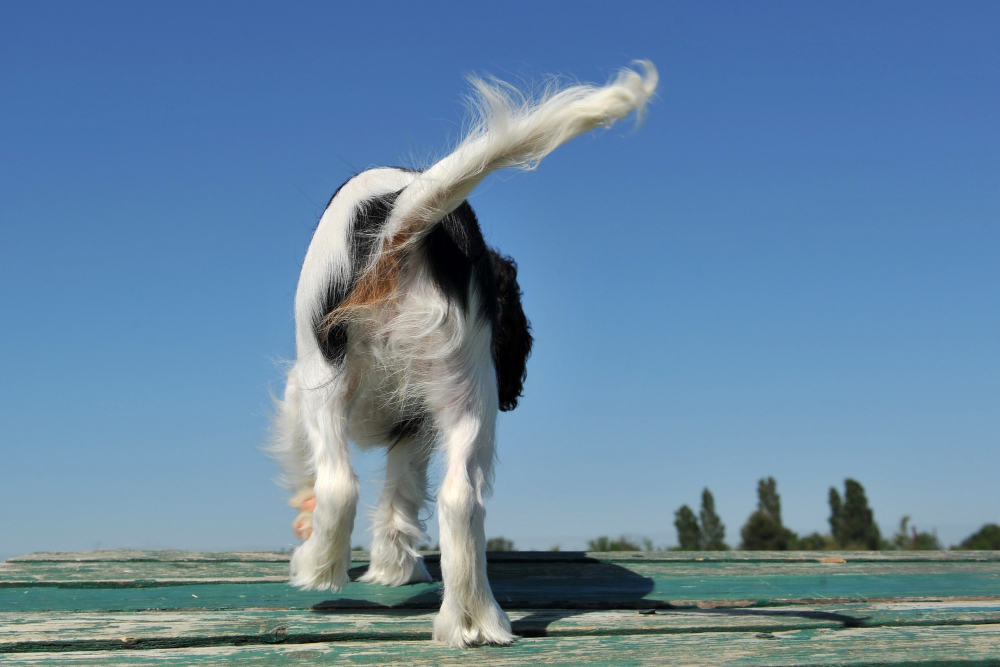Dog owners are familiar with the surprising, often unpleasant surprise of canine flatulence. Questions abound, from the basic “Do dogs fart?” to the more intricate inquiries about the science behind these occurrences. This article seeks to lift the veil on the enigma of dog farts.
The Basic Question: Do Dogs Fart?
Let’s start with the question that strikes us first: do dogs fart? Yes, they do. Flatulence is a common biological occurrence among all mammals, including our furry companions. Dogs, like humans, have a digestive system that processes food, and gas production is an unavoidable by-product of this digestion process.
Understanding Dog Farts: The Composition
Before we explore the aroma (or stench) associated with dog farts, let’s understand their composition. When you’re wrinkling your nose at your pet’s gas, you might be wondering, “Is a fart methane gas?” The answer is partially yes. Dog farts consist of a variety of gases, including nitrogen, oxygen, carbon dioxide, hydrogen, and occasionally, methane. The presence or absence of methane, often dependent on the dog’s diet and digestion, could make some dog farts more potent than others.
Smelly Mysteries: Why Do Dog Farts Smell Worse Than Humans?
Why do dog farts smell worse than humans? This question has puzzled pet owners for years. The answer lies in their different diets and the type of bacteria in their guts. Dogs consume a different diet than humans, often high in meat content, which when broken down in the gut, can produce more foul-smelling gases. Additionally, the type of gut bacteria, which aids in digestion, differs between humans and dogs and can contribute to the odor of flatulence.
Pungent Scents: Dog Farts Smell Like Death or Rotten Eggs
If you’ve ever grimaced and thought, “my dog’s farts smell like death,” or “why does my dog’s fart smell like rotten eggs,” you’re not alone. Foul or extremely pungent farts can be attributed to a diet high in sulfur-rich foods like eggs, meat, or certain vegetables. When these foods are digested, they can produce hydrogen sulfide, a gas that carries a strong, rotten egg smell.
A Surprising Question: Why Do Dog Farts Smell Like Broccoli?
On a lighter note, some dog owners may notice their pet’s farts smelling oddly like broccoli. This isn’t an aromatic hallucination. Dogs who consume vegetables, especially cruciferous ones like broccoli, might emit gas that takes on a similar scent. These vegetables can release certain compounds during digestion that mirror their natural aroma, hence the broccoli-like smell.
The Intent Behind the Wind: Do Dogs Fart On Purpose?
Now, let’s address the amusing notion, do dogs fart on purpose? While it might seem like your pet is intentionally clearing the room at times, dogs don’t have control over their flatulence like humans do. Moreover, they may not even realize when they’re farting. Despite the human tendency to assign intent to their actions, your dog isn’t trying to make a statement with their gas.
A Health Concern: Are Dog Farts Toxic?
Finally, let’s debunk a concern that has probably haunted many dog owners: are dog farts toxic? Rest assured, despite their sometimes deadly smell, dog farts are not toxic to humans. However, frequent or excessively smelly farts could indicate an issue with your pet’s diet or a potential health concern that might require a vet’s attention.
After All, How Do Gases Form In Dogs?
This may come as a surprise to many first-time owners, but dogs fart. The process of gas formation in dogs is very similar to what happens in the human body. Generally speaking, gases have two main origins: they can arise in the mouth, from the air ingested during food, or in the intestine itself, as a result of food fermentation by intestinal bacteria. One of the most common causes of smelly gas in dogs is eating too fast. The ingestion of certain foods that are not so easily digested by dogs can also give rise to the problem.
How To Know If The Dog Has Gas?
Not every dog farts loudly. Some can be quite silent or even suffer from “trapped” gas in the intestine, causing a lot of pain and discomfort. To identify a dog with gas, it is worth paying attention to the following symptoms:
- abdominal pain;
- belly noises;
- gases with unpleasant odors;
- lack of appetite;
- apathy.
As gases cause great discomfort in the pet, try to identify the cause when you realize that your friend is suffering from any of the above symptoms. A recently introduced food in the dog’s diet, for example, maybe the explanation. If the painting persists, schedule an appointment for your buddy at the vet.
What To Do To Avoid Gas Formation In Dogs?
Some simple measures taken on a daily basis help a lot to reduce the formation of gases in your furry friend. If the dog letting out a lot of farts is a problem in your everyday life, check out the following tips:
- Fractionate meals into small portions throughout the day;
- If your dog with gas eats too fast, bet on “slow feeders”, accessories with obstacles that help to slow down the pace of feeding;
- Avoid changing your friend’s diet abruptly, which could cause intestinal problems. All changes must be made gradually;
- Offer quality rations, premium or super premium type. The formulation with noble ingredients reduces the risk of allergies or food intolerance;
- Avoid offering raw foods, as well as milk and derivatives;
- Stimulate the dog to exercise daily through walks and games;
- Follow your friend’s vaccination and deworming schedule correctly;
- Keep the pet continuously protected against ectoparasites. Some of them can transmit parasitic diseases with action in the intestine.
Conclusion
To wrap it all up, dog farts, while often the source of laughs or grimaces, are a completely normal part of your pet’s biological process. Yes, dogs do fart, and these farts can range in smell from deathly to broccoli-like, depending on their diet and digestion. Remember, dogs don’t fart on purpose, and while their farts may sometimes clear a room, they are not toxic.
However, it’s always important to keep an eye on your furry friend’s health. If their farts seem more frequent or excessively smelly, it might be worth a visit to the vet. Changes in their flatulence could indicate dietary issues or potential health problems.
In the end, our love for our dogs surpasses any discomfort their farts might cause. Just remember, the next time you catch a whiff of a potent dog fart, it’s simply part of the science of being a dog.

